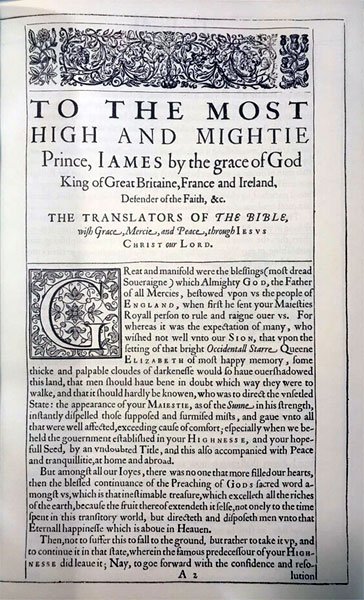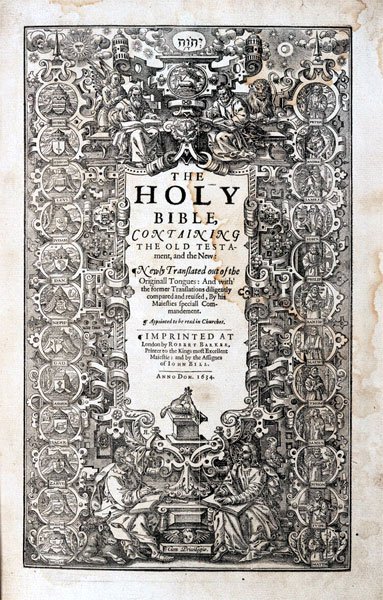
The popularity of the Geneva Bible among England’s laypeople caused Anglican clergy to want something similar to the Bishop’s Bible in its intended use, size, and style, but with a more accurate translation.
In 1604, England’s King James I authorized a new translation of the Bible aimed at settling the thorny religious differences in his kingdom—and solidifying his own power. His immediate predecessor on the throne, Queen Elizabeth I, had ordered the execution of his mother, Mary, Queen of Scots, who had represented a Catholic threat to Elizabeth’s Protestant reign. And even though Elizabeth had established the supremacy of the Anglican Church (founded by her father, King Henry VIII), its bishops now had to contend with rebellious Protestant groups like the Puritans and Calvinists, who questioned their absolute power.

King James gave the translators instructions intended to guarantee that the new version would reflect the structure of the Church of England and its beliefs about an ordained clergy. The translation was undertaken by 47 scholars, all of whom were members of the Church of England. In common with most other translations of the period, the New Testament was translated from the Textus Receptus (Received Text) series of the Greek texts. The Old Testament was translated from the Masoretic Hebrew text, while the Apocrypha were translated from the Greek Septuagint (LXX).
King James was very much in favor of a new translation, but he did not play an active role in the actual work. Still, the King James Version, or Authorized Versions, bears his name and includes a dedication assigned to him in the preliminaries. King James was delighted by the title “Defender of the Faith” and believed that kings were appointed and ruled by divine decree. The “authorized” aspect of the King James Versions pertains more to the exclusive printing rights (“Printer to the King’s most excellent Majesty”) than anything else.
Published in 1611, the King James Bible spread quickly throughout Europe. Because of the wealth of resources devoted to the project, it was the most faithful and scholarly translation to date—not to mention the most accessible. Before, the Bible had been the sole property of the Church, now more and more people could read it themselves. Not only that, but the language they read in the King James Bible was an English unlike anything they had read before. With its poetic cadences and vivid imagery, the KJV sounded to many like the voice of God himself. Described as one of the most important books in English, the King James version bolstered the English-speaking world and contributed to English literacy for countless years.

The King James Bible contained no marginal study notes, and it also lacked illustrations. Apart from first chapter decorated initials, colophons, and a small header to each book, no engravings were included. A Bible that was published in folio size, designed to be read in churches, had no need for illustrations.
There are two variations of the text from 1611 and 1612 based on Ruth 3:15. One printing reads “And he went into the citie” and the other reads “And she went into the citie.” In 1612, quarto and octavo sized editions were released in Roman font. The 1612 quarto and octavo editions also have a “He Bible” and a “She Bible” variant.
As the King James Bible became the dominant text towards the end of the 17th century, some booksellers would purchase illustrations separately from the Netherlands or Germany and rebind them into the King James Bibles for resale.
Countless artists and leaders have been inspired by the King James Bible, its influence can be seen in many of the expressions English speakers use every day. Phrases like “my brother’s keeper,” “the kiss of death,” “the blind leading the blind,” “fall from grace,” “eye for an eye” and “a drop in the bucket”—to name only a few—all owe their existence, or at least their popularization in English, to the KJV.
